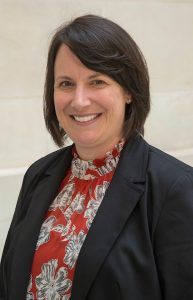August 30, 2019
Women’s Equality Week Q&A with Maggie Walser
Posted by Caitlin Bergstrom
 August 26th is Women’s Equality Day. To celebrate women’s contributions to Earth and space science, we’re devoting this week to featuring Q&As with inspirational women in STEM. #WomensEqualityDay!
August 26th is Women’s Equality Day. To celebrate women’s contributions to Earth and space science, we’re devoting this week to featuring Q&As with inspirational women in STEM. #WomensEqualityDay!
Today, we’re excited to feature Maggie Walser. Maggie is a senior program officer for the Gulf Research Program at the National Academy of Sciences. She is an AGU member since 2007 based in Washington, D. C. Her volunteer experience includes AGU Congressional Science Task Force; science education efforts of the National Academy of Sciences, including participation in our exhibit at the USA Science and Engineering Festival; and serving as a mentor, project judge, and member of the board, D. C. chapter of EnvironMentors, a program that exposes underrepresented high school students to environmental sciences and related career paths.
What inspired you to become a scientist?
I always loved science class, and even when I was little, I wanted to know how things worked, why things worked. I was always solving problems, trying to better understand the world around me. Science became a natural outlet for my curiosity.
I grew up in a small town in Northern California, where understanding and caring for the environment was a fact of daily life. Protecting the environment was important not just because people wanted to maintain their backyards, but the economy depended on using natural resources.
I started college as a chemical engineering major, which was how I discovered a passion for atmospheric chemistry. When I went on to graduate school, my love of science continued to grow. I loved my research and being in the lab, but I wanted to see where my science could take me beyond the traditional researcher-scientist career track. So I came to Washington, D.C. as a Congressional Science Fellow, and then I started working at the National Academies of Sciences. I’ve been devoted to the science policy world ever since.
Who have been your mentors throughout your career?
During graduate school, I had two faculty mentors that were fantastic, and at the Academies my former supervisor, Chris Elfring. They were all particularly helpful in forging a quest to become a scientist. My memories of Chris as an empowering leader, a talented scientist, and a woman are vivid and are still a source of inspiration for me. She was so even-keeled, navigating high-level senior leadership, and large personalities, all while managing a diverse team people with oft-differing approaches to tasks.
At this point in your career, you are a study director, engaging federal agency and Congressional staff on important science topics. Who can you turn to for support and professional guidance?
Recently, I am reliant on peer mentors. We’re friends after work hours, but during the day I know I can rely on them for professional advice and support. We’re all women, and have had similar life and work experiences. Having this all-female support system is so valuable to me – I don’t know where I would be without them!
Why do you think it’s important to get involved in science policy? / In what ways do you engage the general public/non-scientists with your research?
I learned from my background as a research scientist that it was important to make sure policy at the federal and state level is informed by evidence-based research. My career is in science policy, but making the jump from working in labs to policymaking isn’t exclusive. Even without a career switch, opportunities at organizations like AGU and NAS – Congressional Visits Days, volunteering for National Academies committees – working in academia still offers plenty of avenues to connect to policy without making a career switch.
These opportunities are a great place to start to build your engagement profile, but you do have to be proactive and self-motivated to seek them out. These societies offer great training in science communication, which was where I learned how to engage with carefully chosen vocabulary and language. For example, scientists are great at finding answers to hypotheses, but when working with non-scientists, you have to learn how to use information while getting to the point first, emphasizing why the science is important and what we can learn from it.
What advice would you give to those aspiring to work in science?
Try something that doesn’t work it’s not a failure, or a waste of time. Think of it as narrowing down the path you want to take, which is important because there are so many paths are wide open to young science professionals today. Sometimes you find [your path] right away, sometimes you don’t. The journey itself is valuable, because it is a special time to take advantage of every opportunity to do something a little different.
From personal experience, my “side gigs” – organizing seminars, outreach programs in the local schools, founding a chapter of a women’s chemistry society – were the things that wound up to be quite useful in making my leap to policy, and then being successful when I got to DC.
What do you think Earth/space science research should prioritize in the future?
The problems facing our society today are no longer single discipline problems. We need to tackle issues collaboratively, like climate change where scientists and non-scientists have to work together. Diversity of who’s doing the science and the policy work must be a priority. Things are improving, but the science community needs to continue to bring in more women, recruit people of color and in general, scientists with different life experiences and backgrounds. These fresh perspectives are essential to science of the future, as is collaboration.

